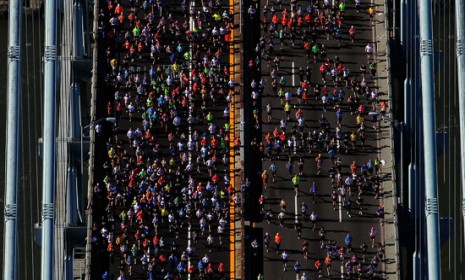Hurricane Sandy: Should the New York Marathon be canceled?
It's one of Gotham's biggest, most financially beneficial events, but should the city's resources be focused on recovery efforts instead of a running race?

A free daily email with the biggest news stories of the day – and the best features from TheWeek.com
You are now subscribed
Your newsletter sign-up was successful
Apparently, not even Frankenstorm Sandy and its record damages will stop New York City from hosting one of its biggest annual events, the ING Marathon, this Sunday. Both Mayor Michael Bloomberg and the race's organizers are keen to move ahead despite crippled infrastructure, subway-system uncertainties, flooding, and power outages. "There is no better city to handle this," says Mary Wittenberg, the president and chief executive of New York Road Runners. Sure, New York is nothing if not resilient, but would its resources be better used elsewhere? Here, a guide:
Why is the city going through with it?
Two reasons. One: The race is a huge money-maker for New York — the marathon was projected to pour $340 million into the city. And two: Moving forward would signal that the city was getting back on its feet. That being said, the marathon — with 47,000 runners signed up, 8,000 volunteers, 1,000 staff members, and, usually, 2 million spectators involved — places high demands on New York's municipal resources, including police and fire departments.
The Week
Escape your echo chamber. Get the facts behind the news, plus analysis from multiple perspectives.

Sign up for The Week's Free Newsletters
From our morning news briefing to a weekly Good News Newsletter, get the best of The Week delivered directly to your inbox.
From our morning news briefing to a weekly Good News Newsletter, get the best of The Week delivered directly to your inbox.
But will all those runners show up?
Hard to say. Eligible runners, who had been asked to cancel by Oct. 31, now have until Saturday to make the decision. For his part, Mayor Bloomberg says he hopes to see about 30,000 runners participating and a "couple million" spectators. Organizers are rescheduling flights to get the sport's elite runners, including three Olympic medalists and the reigning women's world champion, to the starting line on Sunday. Since the marathon comprises a full weekend of events including a kick-off run in Central Park, an all-weekend long fitness expo, and an opening ceremony with fireworks, some festivities will likely be canceled due to low turnout or storm damages.
What are the biggest issues for the race?
Getting to the start line, for one. The marathon begins on Staten Island which is accessible by the Staten Island Ferry, which has yet to resume normal service. And just getting to New York City may be a problem for some of the 20,000 amateur international runners. LaGuardia Airport, parts of which are still submerged, remains closed. JFK and Newark Liberty airports started to reopen Wednesday morning, but will be operating well below capacity. And the New York City subway system is still suspended and will likely remain so for at least four or five days.
A free daily email with the biggest news stories of the day – and the best features from TheWeek.com
What about the route itself?
Luckily, the 26.2-mile course mostly avoids the areas hardest hit by the flooding, including lower Manhattan. But Central Park, the race's end point, is still closed while workers hustle to clean up massive debris left by the storm. The city's bridges and tunnels are starting to reopen, which will give race officials a chance to assess the rest of the course. Otherwise, organizers are ready and willing to make changes. "We will keep all options open with regard to making any accommodations and adjustments necessary," Wittenberg said.
Do people support this decision?
It's a mixed bag with most of the criticism focusing on the issue of taste. Putting on the race just days after a tragically devastating storm may be too soon for some runners, New York Times reporter Mary Pilon tells CBS This Morning. After the 9/11 attacks, the marathon went on as planned and was considered a "unifying event," but that was nearly two months after the disaster. Given the strain on the NYPD during Sandy's recovery, many people are questioning whether policing the marathon is a wise use of the city's resources. Others, posting on the event's website, question whether the food used to feed the runners before, during, and after shouldn't be diverted to the thousands of people still without power. The downside to canceling the marathon is both financial for the city and emotional for the runners who have trained for this event for months. "It's been stressful," one out-of-town, first-time runner tells Bloomberg News. "You don't want to complain. People have lost their houses and are worried about their lives. I'm just running a race."
-
 How the FCC’s ‘equal time’ rule works
How the FCC’s ‘equal time’ rule worksIn the Spotlight The law is at the heart of the Colbert-CBS conflict
-
 What is the endgame in the DHS shutdown?
What is the endgame in the DHS shutdown?Today’s Big Question Democrats want to rein in ICE’s immigration crackdown
-
 ‘Poor time management isn’t just an inconvenience’
‘Poor time management isn’t just an inconvenience’Instant Opinion Opinion, comment and editorials of the day